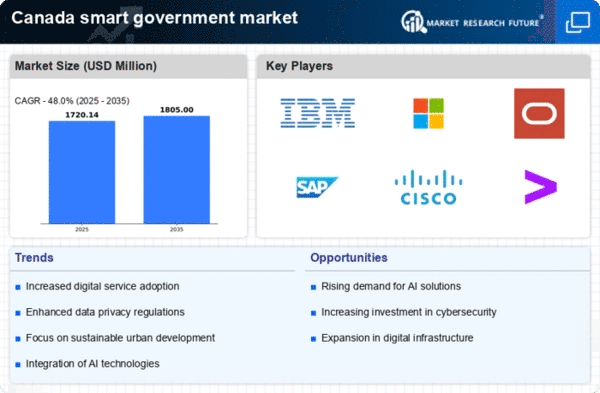Collaboration with Private Sector
Collaboration with the private sector is emerging as a vital driver in the smart government market. Partnerships between government entities and technology firms facilitate the development of innovative solutions that enhance public service delivery. In Canada, such collaborations are becoming more common, with public-private partnerships (PPPs) enabling the sharing of resources and expertise. This synergy can lead to cost reductions and improved service efficiency. The smart government market is thus benefiting from the agility and innovation that private sector involvement brings, allowing governments to leverage cutting-edge technologies and best practices to better serve their constituents.
Enhanced Data Security Regulations
Enhanced data security regulations are becoming increasingly critical in the smart government market. As governments digitize services, the protection of sensitive citizen data is paramount. In Canada, the implementation of stringent data protection laws is driving investments in cybersecurity measures. Government agencies are allocating substantial budgets, with estimates suggesting that spending on cybersecurity could reach $1 billion by 2026. This focus on data security not only safeguards public trust but also ensures compliance with legal frameworks. Consequently, the smart government market is evolving to incorporate robust security protocols, which are essential for maintaining the integrity of digital services.
Integration of Advanced Technologies
The integration of advanced technologies such as artificial intelligence (AI), machine learning, and the Internet of Things (IoT) is a pivotal driver in the smart government market. These technologies enhance operational efficiency and improve service delivery to citizens. In Canada, municipalities are increasingly adopting AI-driven solutions to streamline processes, which can lead to cost savings of up to 20%. The smart government market is witnessing a surge in demand for IoT applications that facilitate real-time data collection and analysis, enabling governments to make informed decisions. This technological integration not only optimizes resource allocation but also fosters transparency and accountability in public services.
Growing Demand for Citizen-Centric Services
The growing demand for citizen-centric services is reshaping the smart government market. Citizens expect seamless access to government services through digital platforms, which necessitates a shift in how governments operate. In Canada, approximately 75% of citizens prefer online services for their interactions with government agencies. This trend compels governments to invest in user-friendly digital interfaces and mobile applications, enhancing accessibility and engagement. The smart government market is thus evolving to prioritize user experience, ensuring that services are tailored to meet the diverse needs of the population. This focus on citizen-centricity is likely to drive innovation and improve overall satisfaction with public services.
Increased Focus on Sustainability Initiatives
An increased focus on sustainability initiatives is emerging as a significant driver in the smart government market. Canadian governments are prioritizing eco-friendly practices and sustainable development to address climate change and environmental concerns. This shift is reflected in the adoption of smart technologies that promote energy efficiency and reduce carbon footprints. For instance, smart waste management systems are being implemented in urban areas, leading to a reduction in waste collection costs by up to 30%. The smart government market is thus aligning with sustainability goals, which not only enhances public welfare but also attracts funding and investment for green projects.
















